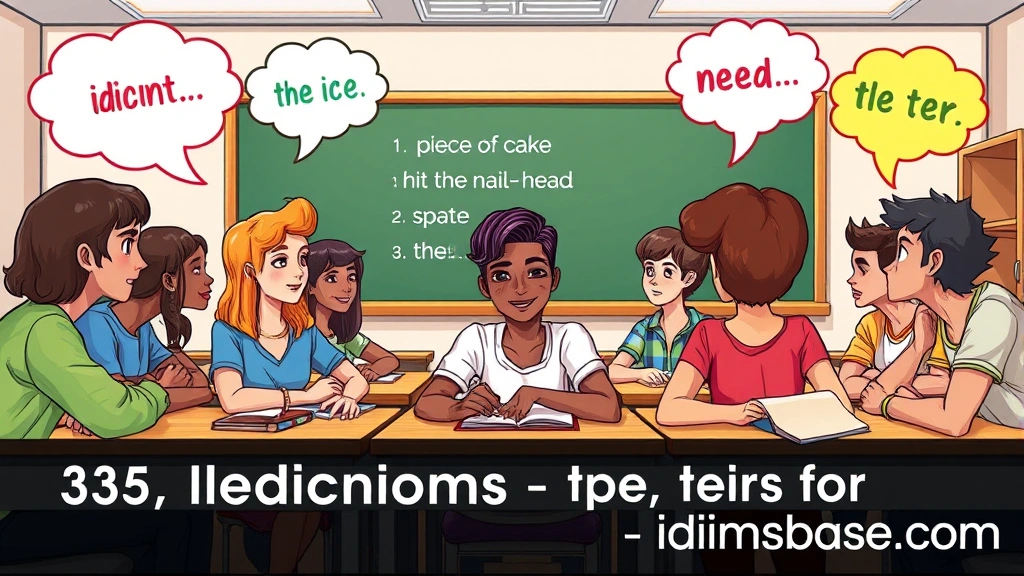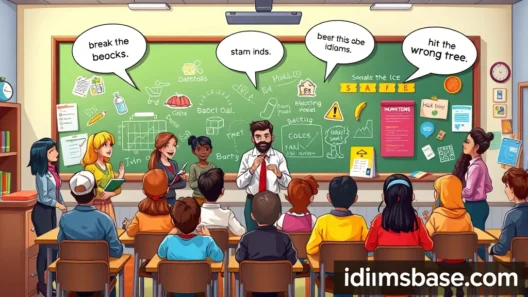Hey there, awesome reader! Ever feel like adults are speaking a secret language? You know, when they drop phrases that make absolutely no sense in context? Like, "hold your horses" when there isn't a single pony in sight, or "spill the beans" when all you have is a glass of water? Well, you're not alone! That secret language often involves something super cool called idioms.
Idioms are phrases where the meaning isn't obvious from the individual words. They're like little linguistic puzzles, full of history, culture, and sometimes, a good laugh. Understanding them can seriously level up your communication game, make reading more fun, and even help you ace those English classes. Plus, using them makes you sound super smart and totally in the know!
So, are you ready to unlock some of these linguistic mysteries? We've put together a fantastic list of 35 idioms for teens that are commonly used and super useful. Get ready to expand your vocabulary, impress your friends, and maybe even understand your parents a little better! Let's dive in!
35 Idioms to Add to Your Awesome Vocabulary
Here's your go-to list of idioms, complete with simple explanations and examples to show you how they work in real life. Get ready to become an idiom expert!
-
Break a leg!
- Meaning: Good luck! (Often said before a performance or big event).
- Example: "You have your big presentation today? Break a leg!"
-
Bite the bullet
- Meaning: To face a difficult or unpleasant situation with courage.
- Example: "I didn't want to study for the test, but I had to bite the bullet and do it."
-
Hit the books
- Meaning: To study hard.
- Example: "I've got a huge exam tomorrow, so I need to hit the books tonight."
-
Spill the beans
- Meaning: To reveal a secret.
- Example: "Come on, spill the beans! What did you get for your birthday?"
-
Cost an arm and a leg
- Meaning: To be very expensive.
- Example: "That new video game console must have cost an arm and a leg!"
-
Piece of cake
- Meaning: Something very easy to do.
- Example: "The math homework was a piece of cake after I understood the formula."
-
Under the weather
- Meaning: Feeling slightly ill or unwell.
- Example: "I'm feeling a bit under the weather, so I might skip practice today."
-
Hit the road
- Meaning: To leave.
- Example: "It's getting late; we should probably hit the road."
-
Hold your horses
- Meaning: Wait a moment; slow down.
- Example: "Hold your horses! Don't forget your backpack."

-
Pull someone's leg
- Meaning: To tease someone; to playfully trick someone.
- Example: "I told him I won the lottery, but I was just pulling his leg."
-
On the same page
- Meaning: To be in agreement or understanding.
- Example: "Let's make sure we're on the same page about the project deadline."
-
Get cold feet
- Meaning: To suddenly become too nervous to do something you had planned.
- Example: "I was going to try out for the play, but I got cold feet."
-
See eye to eye
- Meaning: To agree with someone.
- Example: "My brother and I rarely see eye to eye on anything."
-
When pigs fly
- Meaning: Something that will never happen.
- Example: "He'll clean his room when pigs fly!"
-
Break the ice
- Meaning: To initiate social interaction in a tense or awkward situation.
- Example: "The teacher played a game to help us break the ice on the first day."
-
Bite off more than you can chew
- Meaning: To take on a task that is too big or difficult to handle.
- Example: "I think I bit off more than I could chew by joining three clubs this semester."
-
Get out of hand
- Meaning: To become difficult to control.
- Example: "The party started to get out of hand, so we decided to leave."
-
Speak of the devil
- Meaning: Said when the person you were just talking about unexpectedly appears.
- Example: "Oh, speak of the devil! We were just talking about you."
-
Go the extra mile
- Meaning: To do more than what is required or expected.
- Example: "She always goes the extra mile to help her friends."
-
Add insult to injury
- Meaning: To make a bad situation even worse.
- Example: "First, I lost my phone, and then, to add insult to injury, it started raining."
-
Beat around the bush
- Meaning: To avoid getting to the point; to talk indirectly.
- Example: "Stop beating around the bush and just tell me what happened."

-
Every cloud has a silver lining
- Meaning: Every difficult or unpleasant situation has some positive aspect.
- Example: "I didn't get into my first-choice college, but every cloud has a silver lining – I found a great program at another school."
-
Head in the clouds
- Meaning: To be daydreaming or impractical.
- Example: "He always has his head in the clouds during class."
-
In the same boat
- Meaning: To be in the same difficult situation as someone else.
- Example: "We're all in the same boat when it comes to studying for finals."
-
Jump on the bandwagon
- Meaning: To join a popular trend or activity.
- Example: "Everyone is buying those new sneakers; I guess I'll jump on the bandwagon too."
-
Let the cat out of the bag
- Meaning: To accidentally reveal a secret.
- Example: "I accidentally let the cat out of the bag about the surprise party."
-
Miss the boat
- Meaning: To miss an opportunity.
- Example: "If you don't apply soon, you'll miss the boat for that scholarship."
-
Once in a blue moon
- Meaning: Very rarely.
- Example: "My brother helps with chores once in a blue moon."
-
Pull yourself together
- Meaning: To calm down and regain control of your emotions.
- Example: "After the bad news, she took a deep breath and pulled herself together."
-
Take a rain check
- Meaning: To decline an invitation but suggest doing it at a later time.
- Example: "I can't make it to the movies tonight, but can I take a rain check?"
-
Through thick and thin
- Meaning: Through good times and bad times.
- Example: "True friends stick with you through thick and thin."
-
Wrap your head around something
- Meaning: To understand something complicated.
- Example: "It's hard to wrap my head around quantum physics."
-
You can't judge a book by its cover
- Meaning: You shouldn't make judgments about people or things based solely on their outward appearance.
- Example: "He looks quiet, but you can't judge a book by its cover; he's actually hilarious."

-
The ball is in your court
- Meaning: It's your turn to make a decision or take action.
- Example: "I've given you all the information; now the ball is in your court."
-
Burn the midnight oil
- Meaning: To stay up very late working or studying.
- Example: "I had to burn the midnight oil to finish my essay before the deadline."
Frequently Asked Questions About Idioms
Got more questions about these quirky phrases? We've got answers!
What exactly is an idiom?
An idiom is a phrase or expression whose meaning cannot be understood from the ordinary meaning of its words. Think of it like a secret code where the words together mean something totally different from what they mean separately. For example, "kick the bucket" doesn't mean literally kicking a bucket; it means to die.
Why are idioms so important to learn?
Learning idioms is super important for several reasons!
- Better Understanding: They're used all the time in everyday conversations, books, movies, and music. Knowing them helps you understand native English speakers better.
- Sound More Natural: Using idioms makes your English sound more natural, fluent, and sophisticated.
- Cultural Insight: Many idioms reflect cultural values, history, or common experiences, giving you a peek into the culture behind the language.
- Improved Reading Comprehension: When you read, you'll encounter idioms often. Understanding them helps you grasp the full meaning of texts.
- Increased Vocabulary: They add a whole new layer to your vocabulary, making your language richer and more expressive.
Are idioms used differently depending on where you are in the world?
Absolutely! While many idioms are common across all English-speaking countries (like "break a leg"), some are more specific to certain regions (like "wicked" for "very good" in some parts of the US, or "taking the mickey" for "teasing" in the UK). It's fascinating how language can vary!
How can I practice using idioms?
Great question! The best way to practice is to use them!
- Listen Actively: Pay attention to how native speakers use idioms in conversations, TV shows, and songs.
- Read Widely: Look for idioms in books, articles, and online content.
- Start Small: Pick a few idioms from our list and try to use them in your daily conversations or writing. Don't try to master all 35 at once!
- Keep a Journal: Write down new idioms you learn, their meanings, and example sentences.
- Practice with Friends: Challenge your friends to use new idioms in your conversations. Make it a game!
Do all idioms make sense if you think about their literal meaning?
Nope, and that's the fun (and sometimes confusing!) part! The whole point of an idiom is that its meaning is usually non-literal. If you try to understand "it's raining cats and dogs" literally, you'd be looking for animals falling from the sky, which would be quite a sight, but not what the idiom means!
What's the difference between an idiom and a proverb?
Good question!
- Idiom: A phrase where the meaning isn't obvious from the individual words (e.g., "spill the beans"). It's more about expression.
- Proverb: A short, well-known saying that expresses a general truth or piece of advice (e.g., "Actions speak louder than words" or "A stitch in time saves nine"). Proverbs are more like mini-lessons.
Key Takeaways
Wow, you've just unlocked a treasure chest of 35 idioms for teens! Here's a quick recap of what we've covered and why it's so valuable for you:
- Idioms are Everywhere: They're a fundamental part of everyday English, spoken and written.
- Boost Your Understanding: Knowing idioms helps you grasp what people really mean, making reading and listening much clearer.
- Sound More Natural: Using them yourself makes your English sound more authentic, fluent, and impressive.
- Cultural Connection: Idioms offer a peek into the cultural nuances and history of the English language.
- Practice Makes Perfect: The more you expose yourself to idioms and try to use them, the more naturally they'll become part of your vocabulary.
So, don't let these cool phrases be a mystery anymore! Start incorporating them into your conversations, look for them in your favorite shows, and have fun with them. You're now well on your way to becoming an idiom whiz, and that's a skill that will definitely help you "go the extra mile" in your English journey!
What's your favorite idiom from the list? Or maybe you know one that wasn't mentioned? Share your thoughts in the comments below! We'd love to hear from you and keep the idiom-learning fun going!






